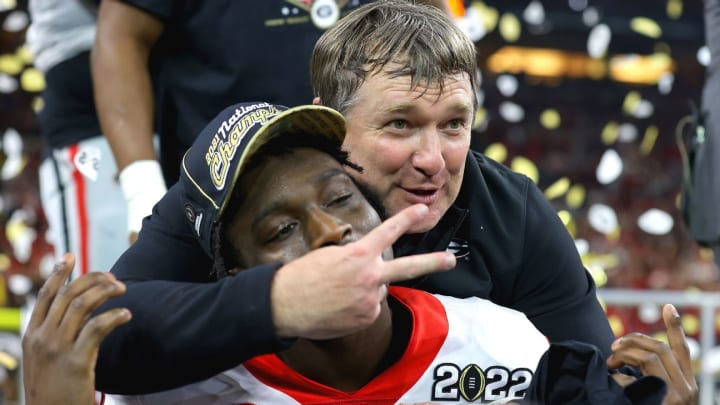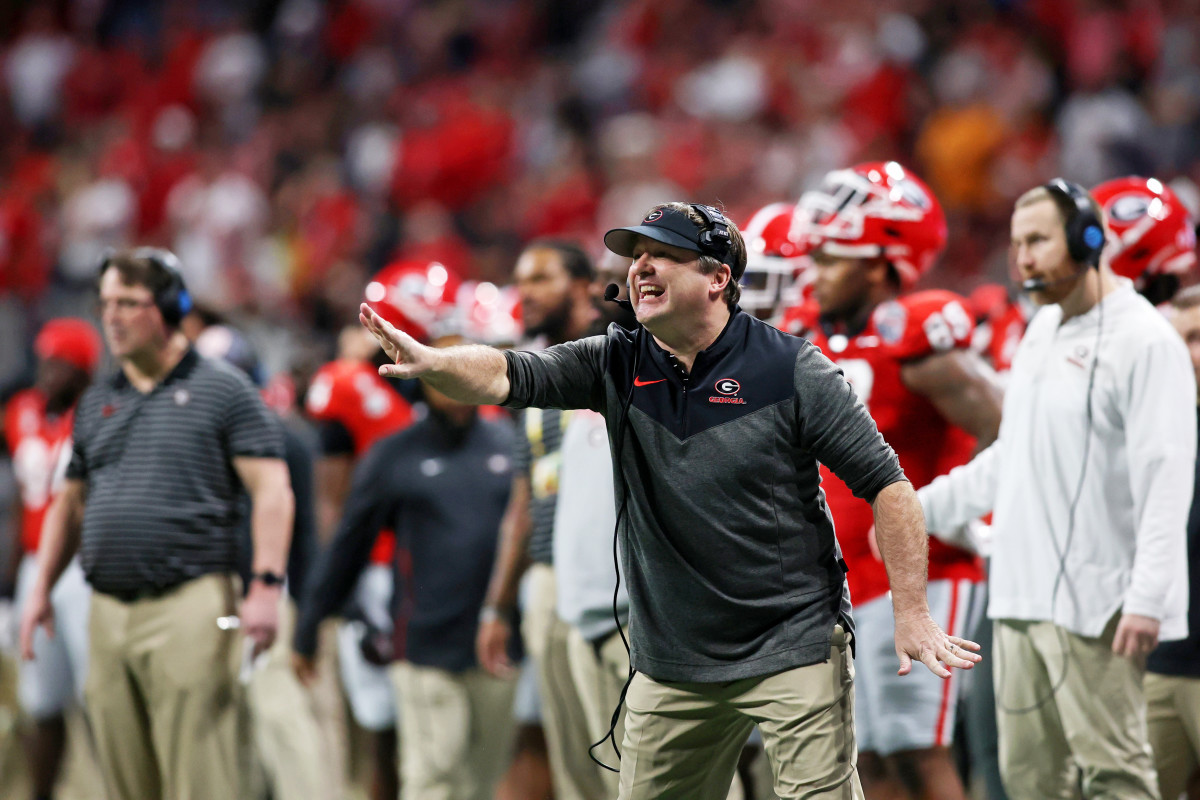Kirby Smart Shares Insight Into How He Built Georgia into a Championship Program

In his seven years as Georgia’s Head Football Coach, Kirby Smart has transformed a proud but underachieving program into one of the preeminent programs in college football. Prior to his arrival in Athens, former Georgia Head Coach Mark Richt elevated the trajectory of the program and delivered a pair of SEC titles in his 15 years on the job, but it was Smart who took the ball Richt handed him and blew the proverbial lid off of the Georgia program to the tune of two national championships and seemingly counting. As he is poised to lead the Bulldogs into the 2023 season on a quest for an unprecedented third-consecutive national title, Smart joined UGA's sports psychologist Drew Bannon on “The Growth Project” podcast earlier this week and shared valuable insight into the factors outside of talent and scheme that have helped him build the Georgia program into the championship machine it has become under his watch.
On a fundamental level, Smart explained how as a first-time head coach at the relatively young age of 40 when he took over the reins of the Georgia program, it was essential for him to identify the “critical factors” that would guide every decision that he would make as the Georgia head coach.
“For me, when I got this seat, it was like, okay, I’ve got to make all of these decisions, let’s make them based on what matters: how do we develop young men and women, how do we graduate them, and how do we win championships. And really, if you try to make every decision based around those things, those critical factors, then you have some direction, you have some guidance on how you want to do it.”
While Georgia’s recruiting efforts have resulted in the Bulldogs annually being one of the nation’s most talented teams, those who follow the program understand the role that the culture Smart has developed within the Georgia program has played in harnessing and maximizing the talent on the roster. When asked about that culture, Smart spoke to how crucial the commitment the Georgia athletic administration has made to the program has been to the Bulldogs’ overall success during his tenure.
“Well the first way we’ve built it [culture] is through help, as you well know. We’ve gotten outside assistance, we’ve got a tremendous staff, I mean I have the luxury here of one of the best staffs in the country. I couldn’t have that without my administration. They pump all kinds of amenities, when you start talking about the things we have at our disposal, being able to use outside groups like yourself, being able to use the people that we’ve hired.”
Yet, while Georgia’s administration is fully aligned with his vision for the program, Smart explained how important it has been for him to commit to his own vision and the culture he aspires for his players and coaches to buy into.

“If there is not belief at the top, it will never work. I can say that I didn’t fully believe in doing things like this when I first became a head coach. I didn’t believe in it the second year. I didn’t believe in it the third year. Somewhere along the way it morphed to that, into the mindset part, the training, there’s all these little things you can do as a head coach that people think well that’s hokey, well this is that, but if you believe in it and you get people in your organization to believe in it and buy into it and they are okay being a little uncomfortable, I’ve got coaches that maybe have never done that, they are older than me and they’ve been coaching longer than me. They’re an assistant coach and they are like “well I’ve never done it this way,” well hey we are going to do it this way here because this is what I believe in. Let’s just try it and see if it works. And we’ve done that and it has worked.”
While the head coach is responsible for setting the standard within a program, Smart explained that, beyond talent, one of the primary factors that has distinguished the Georgia program from the rest of its peers around the country is the manner in which his staff and players have bought into his system and approach.
“It doesn’t matter what you say or what you do, these programs that you put in and implement if you don’t believe in them, and the people in this organization, they believe that it matters how you talk to players, how much time you spend with the players, how much the players reinvest in themselves. I think the biggest difference in those two games, we won 12 or 13 games and lost two or lost one, the biggest difference in the last two years has been the players themselves believing in each other and kind of buying in and connecting. I can’t say that the other teams weren’t. They were connected. They had good buy-in and good culture, but the last two have just been different.”
With a profound understanding of the importance of connection and culture in building a sustainable championship program, Smart detailed his staff’s off-the-field efforts to invest in their players and develop player leadership within the Georgia program.
“When you see that difference, and it might be three players difference in terms of leadership. Not in terms of talent, because we’ve had talent, but the leadership that we have had internally and what we have done with them as a staff to bring that out. We’ve given them a platform to lead. We’ve let guys get up in front of the team and talk. We’ve immersed ourselves in sacrificing time away from football and investing in the person and I think we’ve gotten really good return on that investment based on the last two years seeing us grow these young men into really good leaders. I’ve heard it, and you’ve talked about it before, if you invest in human capital, it’s the best investment you can make bar none.
While the talent Kirby Smart has been able to assemble in Athens is undeniable, the Georgia head coach continues to emphasize the leading role that culture and connection have played in his program’s rise to the top of the college football landscape.
